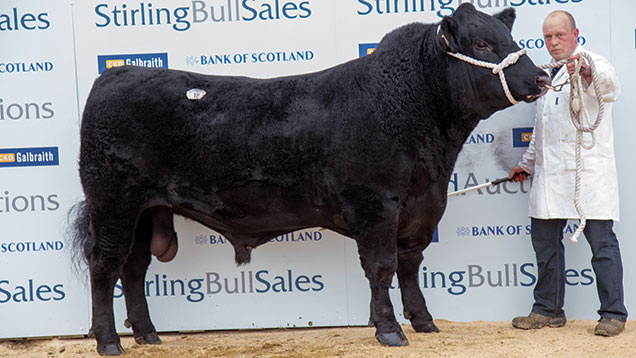Calves born from bull’s frozen testes
 Linton Gilbertines Rocco. (c) Tim Scrivener
Linton Gilbertines Rocco. (c) Tim Scrivener Two calves have been born on a Scottish farm following a pioneering procedure, believed to be the first of its kind.
The calves’ sire, Linton Gilbertines Rocco, was purchased by Kelso farmer John Elliot at Stirling in October 2013 for the top price of £12,000.
But he broke his leg in a freak accident just a few months later, before he had chance to serve any cows, and had to be put down.
A devastated Mr Elliot, who was desperate to salvage his genes, embarked on a procedure to preserve the bull’s semen, believed to be the first of its kind in the UK.
Mr Elliot explained: “We had made quite a substantial investment in the bull. We had followed his progress from a young calf and he was what we were looking for in our breeding programme, so we were willing to do pretty much anything to make sure we didn’t lose those genetics.
“We called our vet and he said he thought it would be worth taking him to the college vets in Edinburgh. We expected the worst, but we hoped we would save the leg.”
But a trip to the Royal Dick Vet School confirmed their worst fears and they were forced to put the bull down. However, there was light at the end of the tunnel when the vets recommended a technique known as post-castration epididymal sperm extraction. It is commonly used on stallions with irreparable conditions, but up until now has been untested on cattle.
“We did not hesitate. It was a last chance saloon situation,” he explained.
Vets gave Rocco a general anesthetic and surgically removed the reproductive organs.
Mr Elliot then drove more than 200 miles overnight from his farm in Kelso to Stallion AI Services, Whitchurch, Shropshire, with Rocco’s testes packed in ice.
Tullis Matson, from Stallion AI Services, said: “He [John] rang us up and said his vets had recommended us. We did a horse for these particular vets a few weeks before and they thought we might be able to do the same on the bull.
“I didn’t realise it hadn’t been done before. It only became apparent when we read the press.”
In order for the sperm to remain effective it had to be harvested within 48 hours of amputation.
“There are two of us that work on it at the same time because it is such a lengthy procedure,” said Mr Matson.
During the operation, which takes up to five hours, sperm cells are harvested from the epididymis, where sperm is stored, before it is frozen.
The company managed to extract 180 straws of semen.
“When Tullis turned on the microscope he said it [the semen] looked okay, but he didn’t know if it would work,” said Mr Elliot.
Cautious it may not work, Mr Elliot only served five cows last summer, but two fell pregnant and two female calves were born at the farm in Roxburgh Mains, Kelso, last week.
They are believed to be the first of their kind born using the technique.
Mr Elliot said he was “absolutely delighted” following the success and now plans to start using Rocco’s semen heavily within the herd of 160 pure Aberdeen Angus and 100 cross-bred recipients.
He added: “ We turned what was an absolute disaster into a disaster. We would have clearly much preferred to have the bull, but we had no other option to retain those genetics.”


